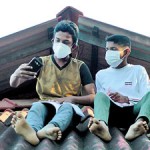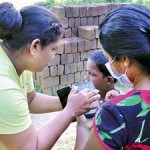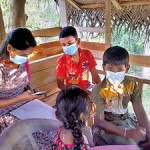COVID triggered education crisis affecting 4.3 million Sri Lankan students: EFSL
View(s):Do not overload children with academic content and focus only on getting them up to speed on essential competencies and postpone all national examinations and other competitive assessments to the end of 2022, the Education Forum Sri Lanka (EFSL) told the Government recently.
While EFSL noted the Advanced Level (A/L) exams require special consideration, it highlights a COVID triggered education crisis affecting the 4.3 million student population in the country.
EFSL Co-Founders Dr. Tara de Mel and Dr. Sujata Gamage, along with close to 40 co-signees from various fields of education, forwarded a letter to the President, Prime Minister, the Education Minister, the Opposition Leader and members of the Ministerial Consultative Committee on Education. The letter highlights the grave consequences of long-term school closures.
Teachers were able to give a real-time classroom experience using software such as Zoom to only five percent of their students and another 40 percent were contacted via social media. This left 55 percent of students without any contact, a survey conducted by EFSL discovered. Teachers from large and small schools across all 25 districts took part in the survey.
“Even those receiving an ‘online’ classroom experience are subjected to the ‘chalk and talk’ style of teaching made worse by the mediation of a digital screen. With no instructions to manage a heavy curriculum under these extraordinary conditions, teachers are rushing to cover the syllabus in the accustomed ‘chalk and talk’ style,” EFSL officials said.
The Education experts said Zoom fatigue is causing even the small percent of children who are online to switch off from any learning, making online education a mere facade.
Developing and executing a plan for re-opening schools at the earliest possible, to support schools and teachers to reach out to all home-bound children, to reduce curricular and examination burden on home-bound students and continue with reduced curricular and examination burden as students get back to school were some of the recommendations made by EFSL.
“Direct the National Institute of Education to identify essential learning competencies for those in grade 1-11, noting that collegiate level grades 12-13 require different solutions. Do not wait till 2023 to introduce proposed education reforms. Proposed reforms aim to reduce the examination-based content of the curriculum to 30 percent and enable activity-based learning for the other 70 percent. This is the moment to pilot the reforms. Trust our provincial, zonal, and divisional education experts and principals and teachers to experiment with minimum guidelines from the centre. Circumstances have forced them to experiment without guidance from the centre anyway,” the EFSL officials said.
They also urged the authorities to vaccinate all teachers as they were also frontline workers.
“Order low-cost test kits focusing on testing high-risk areas first. Decentralise decision making to allow each school to re-open to the maximum extent possible as per each local situation. Instruct schools to prioritise the education of the most vulnerable children and conduct distance education using offline methods as the base. Support the teachers with funds for devices and other tools they need to adapt to the individual situation of each child,” they said.
“Not all homes are safe for children. For some children, school is often the place where they find a respite. Isolated due to COVID-19, children have no escape from family conflicts and even violence, and some cases they themselves suffer physical, emotional, and sexual abuse,” the experts pointed out.
Instructing Grama Niladhari level committees to work with schools to follow-up on social, emotional, nutritional and other needs of each child in their jurisdictions, was also recommended by EFSL.
“We are yet to find the effects of hours spent on the Internet without adequate preparation or supervision, or the COVID learning losses. It would be a grave mistake to trivialise or ignore this situation. The education crisis would be the one that would remain even after the pandemic settles,” the experts said.
They also urged the government to seek help from all quarters including the cross section of signatory educationists, civil society organisations and other professionals to prevent the COVID education crisis from becoming a catastrophe.
“Civic groups across the country have been convening dialogues on all aspects of distance education during the pandemic. Resources are available on offline distance education, social-emotional learning, emergency preparedness of schools and other topics related to proposed solutions,” they added.










